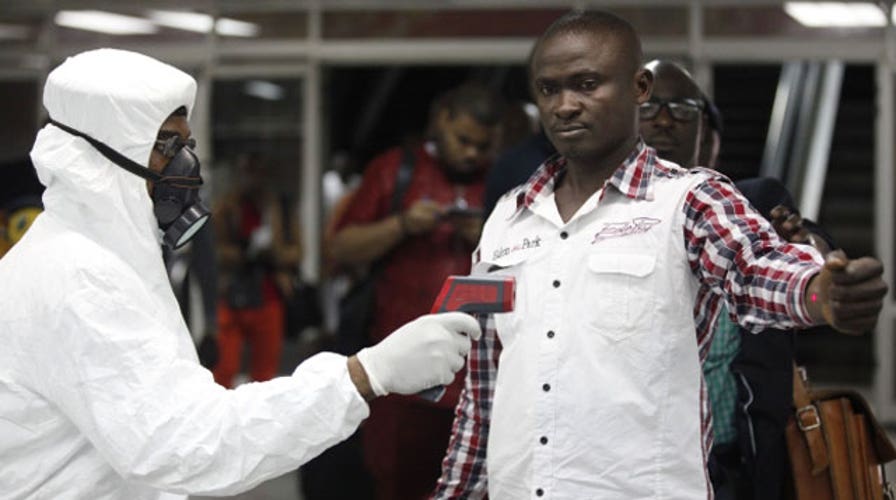Should air travel from Ebola hot zones be restricted?
Jonathan Serrie reports from Atlanta, Georgia
President Obama declared the Ebola outbreak a “national security priority.” That was three weeks ago. Yet, he has failed to treat it as such.
He could ban all travel into the U.S. of any person who has been in the affected West African countries. He has the legal power to do so.
Why hasn’t he?
The fundamental duty of the nation’s chief executive is to protect its citizens. Under Article II of the Constitution, he is duty-bound to respond to threats and to conduct the country’s foreign affairs. When a crisis presents itself, the president has nearly unfettered power and discretion to act. This includes protecting the health and safety of Americans. Does stopping the deadly spread of Ebola constitute such a crisis?
“This is a social crisis, a humanitarian crisis, an economic crisis, and a threat to national security beyond the outbreak zones.” Those are the words of the director general of World Health Organization during an emergency meeting of the United Nations Security Council.
So, yes… this is a crisis. A deadly one. In West Africa, Ebola has infected 6,500 people and killed 3,000. In one week alone, more than 700 new cases emerged. The disease is accelerating, not abating.
President Obama insisted that the chances of Ebola reaching the U.S. was “extremely low.” That was September 16th. A mere four days later, a man infected with Ebola arrived here from Liberia -- allegedly having lied at the airport in Monrovia about whether he'd had contact with anyone infected with Ebola. But his deception would have failed had President Obama ordered the travel ban on September 8th at the same time he was declaring Ebola a national security priority.
There is little doubt that other infected cases will reach our shores as the president dithers.
The screening of travelers before boarding -- on the assumption that they cannot transmit the disease until they are symptomatic-- is so inadequate as to be ludicrous. The director of the Centers for Disease Control confirms that an infected traveler could pass the screening during incubation, but become symptomatic on the plane. Or when he arrives. By then it is too late. And since the initial symptoms mimic a variety of illnesses, including the common cold, the traveler could go for days undetected and undiagnosed. All the while, the disease is transmitted to many others with whom he comes in contact here in the U.S.
Which brings up another canard upon which the White House relies: transmission. We are assured that Ebola is spread by direct contact with blood, mucus, saliva and other bodily fluids from an infected person. As if that’s supposed to make us feel safer. We’re told it cannot be transmitted through the air. Seriously? Think about that. Let’s say an infected passenger gets past screening and begins coughing, which is the body’s natural mechanism to evacuate the lungs. Any scientist will tell you that when someone coughs, microscopic droplets of saliva are projected from the mouth and into the air a distance of 7 to 12 feet. It is often invisible to the naked eye, but it can be inhaled by others and enter their respiratory tract or otherwise be ingested. It can also land on surfaces. This is how the influenza virus is often transmitted and spreads. Why not the Ebola virus?
A U.S. ban on air travel from the nations affected by Ebola makes sense. Multiple countries have done so. And so have some American companies, including Exxon Mobil. Several airlines have cancelled all flights. What is the downside? Economic loss? How does the financial cost begin to compare to the potential loss of human lives?
Past U.S. presidents have exercised their constitutional authority to institute travel bans whenever American lives were in jeopardy. Indeed, so has President Obama. In July, all flights to Israel were temporarily prohibited because the escalating violence threatened the safety of our citizens traveling there. A similar ban to Lebanon was imposed after the 1985 hijacking of a TWA jetliner to Beirut. The tragic events of 9-11 also prompted severe travel restrictions to protect national security.
A comparable health-related ban occurred at the height of the AIDS epidemic. President Reagan imposed a prohibition on HIV-positive foreigners. Years later, President Clinton signed into law a bill that codified the ban. Thus, there is ample legal precedent.
The deadly Ebola continues to ravage West African countries and threatens to escalate beyond the continent. If it is, as President Obama claims, a “national security priority,” why then has he failed or refused to make the health and safety of American lives a priority?

